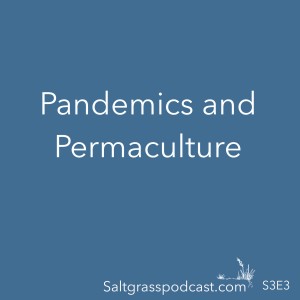
Sunday Aug 23, 2020
S3 E3 Pandemics and permaculture
In this episode we are talking about masks, refugees and permaculture…. How are those things related? Well, in several ways it turns out.
We have three guests: Ginny Thomas has been working with refugee and immigrant women through an organisation called Sisterworks and they have been making washable, re-usable, cloth masks. Virginia Solomon has also been making masks, but this time as a fundraiser for Permaculture Australia, she talks to us about masks, waste and permaculture. Then finally Ian Lillington has been a leader in and educator of permaculture here in Central Victoria for over a decade and he talks to us about how the permaculture movement has had an impact in our region and also finds ways that masks and mask wearing in times of pandemic are related to the principles of permaculture.
Saltgrass is produced in Castlemaine, on Jaara country, home of the Dja Dja Wurrung people. We pay respects to elders past, present and emerging.
Resources and Links:
Masks as pollution:
Some notes on masks and coronavirus:
Some videos about mask wearing from the World Health Organisation
"A dual-layered cloth mask is sufficient to protect people in public settings. It’s unlikely you’ll be infected in public by airborne viral particles. The real threat is touching an infected surface and then putting your hand to your face: Frequent hand-washing is a sure way to avoid COVID-19." Source
Research into the best fabrics to make masks out of
The three C’s Ian spoke of in terms of situations that put you most at risk.
The Department of Health and Human Services’s (DHHS) advice on wearing masks
The DHHS’s mask design
From Ginny's interview:
Two refugee assistance orgs Ginny volunteered with before working at Sisterworks:
From Virginia's interview:
Permaculture's Guiding Principles
Virginia’s website with masks for sale
No comments yet. Be the first to say something!